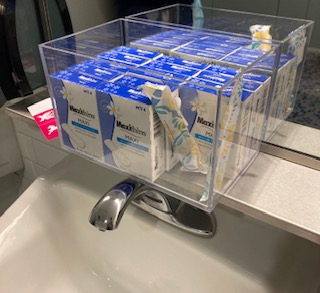Anika Agarwal ‘23
Many students may have noticed that the tampon and pad dispensers in the girls’ restrooms have been consistently empty. Although Episcopal Academy’s mission statement is “challenging and nurturing Mind, Body, and Spirit,” EA fails to comprehensively support the “body” aspect for a large portion of the student population. Given that periods are a regular part in many students’ lives, EA should make menstrual products more accessible and fully stocked in Upper School restrooms.

Photo courtesy of Gaeli Keffer-Scharpf ’23
While disposable menstrual products are readily available at the nurse’s office, not everyone is aware of their existence. Moreover, the nurse’s office in the middle school is quite a trek for Upper Schoolers compared to the restrooms on each floor. Forcing students to go to the nurse to obtain period products treats menstruation as a medical issue, rather than a healthy, normal function of the human body.
Period products were previously available in the restrooms, but have been lacking in the past few years. Naomi Hyman ‘22 recalls, “When I was in middle school, they had baskets by the sink counter with pads and tampons in them, but it was only there for a year or two. After that we didn’t have them anymore. Someone had told me that people were playing around with them or using them inappropriately. Why does that mean you just get rid of them? And they left the baskets too, they just stopped putting stuff in them.”
If Episcopal needs a role model in this particular matter, it can look to Scotland. In November 2020, Scotland became the first country to make menstrual products complimentary at public institutions. The country’s official account tweeted, “That’s right, Scotland has become the first country in the world to make period products free for all. Because in Scotland, we believe it’s fundamental to dignity, equality and human rights.”
In terms of the situation at Episcopal, Kate Smith ’23, Co-President of Young Feminists, says, “I feel that it is absolutely necessary for EA to provide menstrual products in our bathrooms because we as a community need to eliminate the stigma around periods. Providing young women with these products in our bathrooms will not only offer accessibility, but will contribute to a significantly more welcoming school environment for us.”
Similar to finding yourself in a stall that’s out of toilet paper, it is just as inconvenient to not have a pad or tampon available. It would be considered an issue if the restrooms lacked toilet paper. Although menstrual products are less in demand, they are no less important. Smith comments, “It’s as if the administration or whoever would be in charge of providing it for us completely forgot and just deemed it as unnecessary and neglected our needs.”
It is time we resolve this issue. EA faculty agree that providing period products to students is a necessity. Ayinde Tate, Director of Diversity, Equity, and Inclusion, explains, “[Menstruation] is a natural thing. Instead of having people feel the pressure of bringing their own menstrual products, why not supply them in there for girls? At a minimum, provide a container with feminine products for anyone that needs them.”
That said, it is a privilege that we have the opportunity to request easier-to-access menstrual products when so many others don’t have access to them at all. The World Bank estimates that globally, 500 million women lack access to adequate facilities for managing menstruation. In many communities worldwide, women are ostracized from daily life due to the belief that periods are dirty. Hence, we are lucky enough to live in a community where it is feasible for access to these products to be made as easy as possible for us. Agnes Irwin Senior Chelsea Seegars commends the availability of menstrual products at AIS, saying, “With all of the money these private schools have and their desires to support their students, it makes sense that they should accommodate necessary hygiene products.”